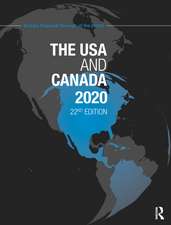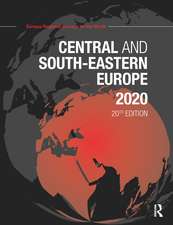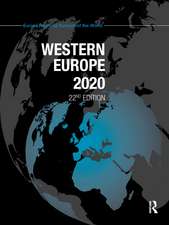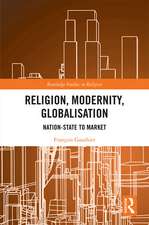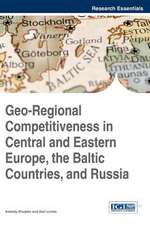Global Monetary and Economic Convergence: On the Occasion of the Fiftieth Anniversary of the Marshall Plan: Routledge Revivals
Editat de Gusztáv Báger, Miklós Szabó-Pelsóczien Limba Engleză Paperback – 30 iun 2020
| Toate formatele și edițiile | Preț | Express |
|---|---|---|
| Paperback (1) | 225.74 lei 6-8 săpt. | |
| Taylor & Francis – 30 iun 2020 | 225.74 lei 6-8 săpt. | |
| Hardback (1) | 847.73 lei 6-8 săpt. | |
| Taylor & Francis – 9 aug 2018 | 847.73 lei 6-8 săpt. |
Din seria Routledge Revivals
- 9%
 Preț: 801.71 lei
Preț: 801.71 lei - 8%
 Preț: 432.64 lei
Preț: 432.64 lei -
 Preț: 168.89 lei
Preț: 168.89 lei -
 Preț: 245.88 lei
Preț: 245.88 lei -
 Preț: 309.79 lei
Preț: 309.79 lei -
 Preț: 258.73 lei
Preț: 258.73 lei - 9%
 Preț: 764.35 lei
Preț: 764.35 lei - 9%
 Preț: 903.42 lei
Preț: 903.42 lei -
 Preț: 311.18 lei
Preț: 311.18 lei -
 Preț: 357.45 lei
Preț: 357.45 lei - 9%
 Preț: 626.93 lei
Preț: 626.93 lei -
 Preț: 317.54 lei
Preț: 317.54 lei - 9%
 Preț: 764.30 lei
Preț: 764.30 lei -
 Preț: 257.01 lei
Preț: 257.01 lei -
 Preț: 238.40 lei
Preț: 238.40 lei -
 Preț: 259.48 lei
Preț: 259.48 lei - 9%
 Preț: 938.10 lei
Preț: 938.10 lei -
 Preț: 341.33 lei
Preț: 341.33 lei -
 Preț: 264.10 lei
Preț: 264.10 lei -
 Preț: 294.98 lei
Preț: 294.98 lei -
 Preț: 308.89 lei
Preț: 308.89 lei -
 Preț: 207.40 lei
Preț: 207.40 lei -
 Preț: 347.50 lei
Preț: 347.50 lei -
 Preț: 302.59 lei
Preț: 302.59 lei -
 Preț: 389.40 lei
Preț: 389.40 lei -
 Preț: 257.01 lei
Preț: 257.01 lei -
 Preț: 358.30 lei
Preț: 358.30 lei - 9%
 Preț: 640.91 lei
Preț: 640.91 lei - 9%
 Preț: 619.49 lei
Preț: 619.49 lei -
 Preț: 228.88 lei
Preț: 228.88 lei -
 Preț: 265.16 lei
Preț: 265.16 lei -
 Preț: 257.90 lei
Preț: 257.90 lei -
 Preț: 266.06 lei
Preț: 266.06 lei -
 Preț: 258.73 lei
Preț: 258.73 lei -
 Preț: 384.01 lei
Preț: 384.01 lei -
 Preț: 246.38 lei
Preț: 246.38 lei - 9%
 Preț: 832.08 lei
Preț: 832.08 lei -
 Preț: 266.20 lei
Preț: 266.20 lei -
 Preț: 294.53 lei
Preț: 294.53 lei - 18%
 Preț: 695.86 lei
Preț: 695.86 lei - 9%
 Preț: 934.96 lei
Preț: 934.96 lei - 5%
 Preț: 243.38 lei
Preț: 243.38 lei -
 Preț: 274.69 lei
Preț: 274.69 lei -
 Preț: 208.20 lei
Preț: 208.20 lei - 9%
 Preț: 659.19 lei
Preț: 659.19 lei -
 Preț: 259.69 lei
Preț: 259.69 lei - 9%
 Preț: 1038.47 lei
Preț: 1038.47 lei -
 Preț: 389.46 lei
Preț: 389.46 lei -
 Preț: 302.14 lei
Preț: 302.14 lei -
 Preț: 302.27 lei
Preț: 302.27 lei
Preț: 225.74 lei
Preț vechi: 271.23 lei
-17% Nou
Puncte Express: 339
Preț estimativ în valută:
43.21€ • 46.95$ • 36.32£
43.21€ • 46.95$ • 36.32£
Carte tipărită la comandă
Livrare economică 22 aprilie-06 mai
Preluare comenzi: 021 569.72.76
Specificații
ISBN-13: 9781138315501
ISBN-10: 1138315508
Pagini: 501
Dimensiuni: 152 x 219 x 20 mm
Greutate: 0.93 kg
Ediția:1
Editura: Taylor & Francis
Colecția Routledge
Seria Routledge Revivals
Locul publicării:Oxford, United Kingdom
ISBN-10: 1138315508
Pagini: 501
Dimensiuni: 152 x 219 x 20 mm
Greutate: 0.93 kg
Ediția:1
Editura: Taylor & Francis
Colecția Routledge
Seria Routledge Revivals
Locul publicării:Oxford, United Kingdom
Cuprins
Part 1: European Convergence 1. The Fiftieth Anniversary of the Marshall Plan: A Significant Date for the European Union, Hans Beck 2. Humanly Acceptable Answers, Michel Carlier 3. Hungary’s Macroeconomic Stabilization and Recognition of its Focal Position in East Central Europe, Laszlo Akar 4. Hungary’s Recent Monetary and Macroeconomic Trends, Gyorgy Suranyi 5. The Marshall Plan and its Relevance Today, Bernard Snoy 6. Back to Fundamental: Why a Monetary Union for Europe?, Alexandre Lamfalussy 7. European Monetary Union: Progress and Outlook, Robert Raymond 8. The Euro on Schedule: Analysis of its European and International Implications, Michael Sakbani 9. Does EMU Need to Converge in the US Model?, Daniel Gros and Erik Jones 10. Economic Relations of the EU in View of the EMU, Olga Butorina Part 2: Theoretical Issues of Global Coverage 11. Hayek and Triffin: Fragments on Divergence and Convergence in Policy Thinking, Nicolas Krul 12. Globalization, Governance, and Transition – Managing Some of it, Jozef M. van Brabant 13. From the Marshall Plan to New Balances, Gusztav Bager and Miklos Szabo-Pelsoczi 14. The Euro: Hopeful Sign of a New Long Wave Growth, Paul L. Mandy Part 3: East-West Convergences 15. Investment and Growth in the Transition Process, Nicholas Stern and Hans Peter Lankes 16. Monetary Governance in Selected Transition Economies – What has been Achieved?, Maciej Krzak and Aurel Schubert 17. Has the European Union the Right Strategy for Central and Eastern Europe?, Marie-Paule Donsimoni 18. Seven Years of Financial Market Reform in Central Europe, Gerhard Fink and Peter Haiss 19. Disinflation, Fiscal Positions, and Seigniorage – A Comparative Analysis of the EU Countries and Some Remarks on Economics in Transition, Peter Brandner and Eduard Hochreiter 20. The Integration of Russia into the World Monetary System: Macroeconomic Consequences and Problems, Dmitry Smyslov 21. Closing the Development Gap Between Hungary and the European Union, Janos Hoos 22. The Banking System in Slovakia – Actual Problems, Otto Sobek 23. The ‘Principle-Agent’ Conflict in the Period of Post-Communist Transformation in Central and Eastern Europe, Marton Tardos 24. Financing Social Projects in Support of Convergence, Martin Murtfeld 25. The Hungarian Banking System and the Development of Capital Markets, Katalin Botos Part 4: Global Convergences 26. Agenda for a New Monetary Reform, Otto Hieronymi 27. Privatization and Corporate Governance: Some Lessons from the Experience of Transitional Economics, Tito Boeri and Giancarlo Perasso 28. Narrow Banks in Today’s Financial World: US and International Perspectives, Dimitri B. Papadimitriou 29. Corporate Governance amid Global Monetary and Economic Convergence – Their Appearance and Development in Japan, Yoshiaki Toda 30. Globalization of the World Economy and the Lack of Regulation of the Globalized World, Marton Tardos 31. How the World has Changed Since 1980, Robert Solomon.
Notă biografică
Gusztáv Báger, Miklós Szabó-Pelsóczi
Descriere
Published in 1998. Global convergence has many aspects. The first part of this volume deals with European convergence, the second with convergence especially between Eastern and Western Europe. The third part with practical and the fourth with theoretical issues related to Global Convergence. The last part juxtaposes Hayekian and Triffian economic thought.


